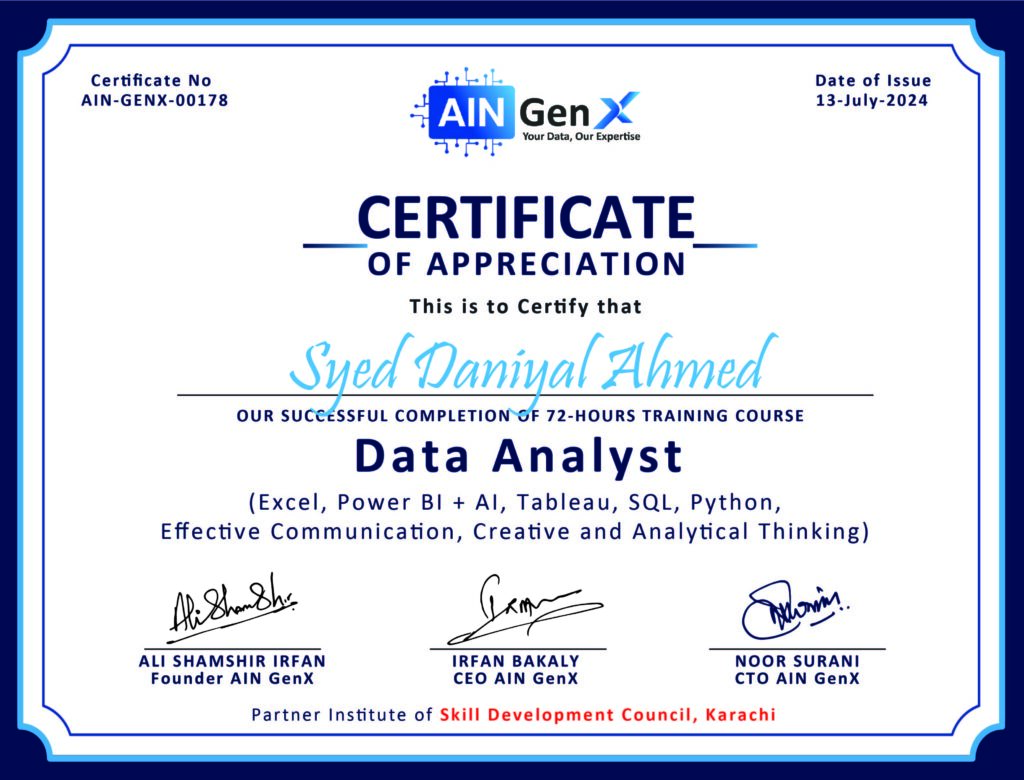
The Microsoft Power BI Data Analyst certification, also known as Exam PL-300, is important for individuals in the field of data analysis and business intelligence for several reasons:
• Industry Recognition: Achieving this certification demonstrates your expertise in Power BI, a widely used business intelligence tool. It serves as a recognized credential of your skills and knowledge in the field.
• Career Advancement: Having a PL-300 certification can open doors to better job opportunities and career advancement. Many employers prefer or require certifications as they validate your proficiency.
• Enhanced Skills: The certification process involves in-depth learning and practical experience, which can significantly enhance your Power BI skills. You'll gain a deep understanding of data analysis, data modeling, and report creation.
• Increased Productivity: With a better understanding of Power BI, you can work more efficiently. This leads to improved data analysis, quicker insights, and more informed decision-making.
• Competitive Advantage: In the competitive job market, having a PL-300 certification can set you apart from other candidates. Employers often seek certified professionals as they are more likely to bring value to their organizations.
• Client Trust: If you plan to start your own software house, as mentioned in your profile, having certified Power BI data analysts can help build trust with clients. They are more likely to choose a company with certified professionals for their data analysis needs.
• Global Reach: Power BI is used by organizations worldwide. This certification is not limited to any specific region, making it valuable for professionals globally.
Prepare the data (25–30%)
Get data from data sources
• Identify and connect to a data source
• Change data source settings, including credentials, privacy levels, and data source locations
• Select a shared dataset, or create a local dataset
• Choose between DirectQuery, Import, and Dual mode
• Change the value in a parameter
Transform and load the data
• Select appropriate column data types
• Create and transform columns
• Transform a query
• Design a star schema that contains facts and dimensions
• Identify when to use reference or duplicate queries and the resulting impact
• Merge and append queries
• Identify and create appropriate keys for relationships
• Configure data loading for queries
Clean the data
• Evaluate data, including data statistics and column properties
• Resolve inconsistencies, unexpected or null values, and data quality issues
• Resolve data import errors
Model the data (25–30%)
Design and implement a data model
• Configure table and column properties
• Implement role-playing dimensions
• Define a relationship's cardinality and cross-filter direction
• Create a common date table
• Implement row-level security roles
Create model calculations by using DAX
• Create single aggregation measures
• Use CALCULATE to manipulate filters
• Implement time intelligence measures
• Identify implicit measures and replace with explicit measures
• Use basic statistical functions
• Create semi-additive measures
• Create a measure by using quick measures
• Create calculated tables
Optimize model performance
• Improve performance by identifying and removing unnecessary rows and columns
• Identify poorly performing measures, relationships, and visuals by using Performance Analyzer
• Improve performance by choosing optimal data types
• Improve performance by summarizing data
Visualize and analyze the data (25–30%)
Create reports
• Identify and implement appropriate visualizations
• Format and configure visualizations
• Use a custom visual
• Apply and customize a theme
• Configure conditional formatting
• Apply slicing and filtering
• Configure the report page
• Use the Analyze in Excel feature
• Choose when to use a paginated report
Enhance reports for usability and storytelling
• Configure bookmarks
• Create custom tooltips
• Edit and configure interactions between visuals
• Configure navigation for a report
• Apply sorting
• Configure sync slicers
• Group and layer visuals by using the Selection pane
• Drill down into data using interactive visuals
• Configure export of report content, and perform an export
• Design reports for mobile devices
Identify patterns and trends
• Use the Analyze feature in Power BI
• Use grouping, binning, and clustering
• Incorporate the Q&A feature in a report
• Use AI visuals
• Use reference lines, error bars, and forecasting
• Detect outliers and anomalies
• Create and share scorecards and metrics
Deploy and maintain assets (15–20%)
Create and manage workspaces and assets
• Create and configure a workspace
• Assign workspace roles
• Configure and update a workspace app
• Publish, import, or update assets in a workspace
• Create dashboards
• Choose a distribution method
• Apply sensitivity labels to workspace content
• Configure subscriptions and data alerts
• Promote or certify Power BI content
• Manage global options for files
Manage datasets
• Identify when a gateway is required
• Configure a dataset scheduled refresh
• Configure row-level security group membership
• Provide access to datasets
Additional Skills You’ll Develop
Understanding Power BI Fabrics
• Overview of Microsoft Fabric for unified analytics
• Role of Power BI in a modern data platform
• Integration of Power BI with Fabric components (Lakehouse, Dataflows, Pipelines)
Creating and Managing Workspaces
• Organizing content (reports, datasets) within Power BI workspaces
• Collaboration and sharing within workspaces
• Permissions and role assignments for workspace security
Best Practices for Workspace Governance
• Setting up workspace environments (dev, test, prod)
• Managing workspace lifecycle and archiving
Creating Real-time Dashboards
• Building visuals and dashboards that auto-refresh with live data
• Using KPIs, gauges, and real-time visuals for instant insights
• Performance tuning for real-time streaming data
Comprehensive Learning from Experts:
• Certified Trainers: Our instructors are industry-certified Power BI experts with real-world experience, ensuring you learn both the theoretical and practical aspects of Power BI.
• Hands-On Training: We offer practical, project-based learning to help you master the skills needed to clear the PL-300 exam and excel in your career.
Beginner to Advanced Curriculum:
• Whether you're just starting with Power BI or already have some experience, our curriculum is designed to take you from basics to advanced-level proficiency, including data modeling, DAX functions, and report building.
Certification Preparation with Real-World Scenarios:
• We focus on PL-300 exam objectives, but also expose you to real-world data problems and business scenarios, ensuring you are job-ready when you achieve certification.
• You’ll work on 20+ industry-related templates and case studies that mirror the kinds of projects you’ll handle as a certified data analyst.
Free Access to Learning Management System (LMS):
• You get 1-year free access to our complete LMS, where you can access study materials, video tutorials, sample datasets, and practice tests anytime, anywhere.
Internship Opportunities:
• We offer exclusive internship opportunities with our partner organizations, allowing you to apply your skills in a professional environment after certification.
Power BI and More:
• Beyond Power BI, you’ll gain exposure to SQL, Python, and Paginated Reports, making your skillset broader and more versatile.
• You'll also get hands-on experience with Power BI Premium, Data Warehousing, and Real-time Data Streaming—key features often used in advanced business intelligence solutions.
One-on-One Mentorship:
• Personalized mentorship and doubt-clearing sessions ensure you’re supported every step of the way.
Affordable and Flexible Learning:
• Our pricing is competitive, with flexible learning options for both online and on-site participants. The course is structured for working professionals, with weekend classes that fit your schedule.
Basic Understanding of Data:
• Familiarity with data concepts such as tables, columns, rows, and basic data structures.
• Experience in working with various data types (numeric, text, date, etc.).
• Understanding of how to collect, organize, and clean data from different sources.
Experience with Microsoft Excel (Recommended but Not Mandatory):
• Proficiency in Excel for data analysis (including Pivot Tables, charts, formulas, and functions).
• Familiarity with basic data analysis in Excel provides a strong foundation for learning Power BI.
Familiarity with Reporting and Visualization Tools:
• Experience with any other data visualization tool (like Tableau, QlikView, or Google Data Studio) is beneficial but not required.
• Understanding how to create basic reports and dashboards.
Basic Knowledge of Databases and SQL (Optional but Useful):
• Familiarity with relational databases and querying using SQL will help in managing and transforming data in Power BI.
• While SQL knowledge is not mandatory, it’s helpful for understanding data structures.
Power BI Basics (No Prior Experience Required):
• You don’t need prior experience with Power BI, but having basic exposure to the tool will help you get started more quickly.
• The course and certification are designed to guide you from beginner to advanced skills in Power BI.
Analytical and Problem-Solving Skills:
• Strong analytical skills and the ability to work with data effectively to generate insights.
• Ability to think critically and apply data analysis to solve business problems.
Experience with Business or Industry-Specific Data:
• Experience working in a business or industry environment where data analysis is required will be beneficial.
• Understanding business metrics, KPIs, and data-driven decision-making processes.
No Programming Experience Required:
• While some understanding of DAX (Data Analysis Expressions) is part of the curriculum, prior programming knowledge is not a prerequisite.
• DAX and other advanced Power BI functionalities will be covered during the certification training.
○ Career Opportunities: Data analysis skills are in high demand across various industries, opening doors to lucrative career opportunities in fields such as finance, healthcare, e-commerce, marketing, and more.
○ Competitive Edge: With the proliferation of data-driven decision-making, possessing data analysis skills gives you a competitive edge in the job market, making you a valuable asset to employers.
○ Versatility: Data analysis skills are transferable across industries and roles, allowing you to explore diverse career paths and adapt to evolving job market trends.
○ Decision-Making Power: By mastering data analysis techniques, you gain the ability to extract actionable insights from complex datasets, enabling informed decision-making and driving business success.
○ Problem-Solving Skills: Data analysis involves critical thinking, problem-solving, and hypothesis testing, fostering the development of valuable analytical skills that are applicable in various contexts.
○ Career Growth: Data analysts often have opportunities for career advancement, with pathways to roles such as Data Scientist, Business Analyst, Data Engineer, and more, as they gain experience and expertise in the field.
○ Contribution to Innovation: Data analysis fuels innovation by uncovering hidden patterns, trends, and correlations that can lead to new product ideas, process improvements, and strategic initiatives within organizations.
○ Job Satisfaction: Working as a Data Analyst can be intellectually stimulating and rewarding, especially when you see the tangible impact of your insights on business outcomes
High Demand for Data Analysts and BI Professionals:
• Organizations across industries are increasingly relying on data analysis to make informed business decisions, which has led to a high demand for data analysts and business intelligence (BI) professionals.
• Power BI is one of the most popular BI tools globally, used by small businesses and large enterprises alike for data visualization, reporting, and analytics.
Career Advancement Opportunities:
• Earning the PL-300 certification demonstrates your proficiency in Power BI, making you a competitive candidate for roles such as:
- Data Analyst
- Business Intelligence Analyst
- Data Visualization Specialist
- Power BI Developer
-BI Consultant
• Certification holders often see salary increases and better job prospects, as organizations value the skills required to analyze, visualize, and present data insights.
Industry-Agnostic Skillset:
• Power BI skills are applicable across a variety of industries, including:
- Banking and Financial Services
-Healthcare
-Retail and E-commerce
-Manufacturing
-Telecommunications
-Government and Nonprofits
-Any organization that handles data can benefit from someone skilled in Power BI, making your skills transferable and versatile.
Job Market Trends:
• According to recent studies, the demand for professionals skilled in data analysis and business intelligence tools like Power BI is growing exponentially. The market for BI and analytics is projected to grow by $43.03 billion by 2028, with Power BI being one of the most sought-after tools.
• The certification helps you stand out in a competitive job market, as employers look for candidates who have both technical and analytical skills to deliver actionable insights.
PL-300 is a Gateway to Other Microsoft Certifications:
• After achieving the PL-300 certification, you can expand your expertise by pursuing other Microsoft certifications, such as:
- Microsoft Certified: Azure Data Engineer Associate
- Microsoft Certified: Azure AI Engineer Associate
- Microsoft Certified: Data Scientist Associate
• This certification can serve as the foundation for higher-level credentials in data science, cloud computing, and AI-related roles.
Increased Efficiency in Data-Driven Decision Making:
• As a certified Power BI Data Analyst, you will have the ability to streamline data collection, transformation, modeling, and visualization. This leads to more effective decision-making processes, helping organizations solve complex business problems through actionable insights.
• Companies are always on the lookout for individuals who can help them leverage data to reduce costs, increase revenues, and improve operations.
Access to Microsoft's Business Ecosystem:
• Power BI integrates seamlessly with other Microsoft products like Azure, SQL Server, Excel, and SharePoint, giving you an advantage in roles where these tools are used in conjunction.
• Microsoft’s cloud-first approach with Power BI Premium and Power BI Embedded enables you to develop skills that align with future trends in data infrastructure and cloud computing.
Future-Proof Your Career:
• The increasing reliance on AI-driven analytics and data visualization tools ensures that Power BI skills will continue to be relevant in the future. With AI and machine learning integration in Power BI, certified professionals will be better equipped to work with predictive analytics and other advanced features.
• Real-time data streaming and advanced data modeling are becoming critical components in decision-making, and PL-300 certification ensures you’re equipped to handle these tasks.
Entrepreneurship and Consulting Opportunities:
• If you're interested in freelancing or starting your own consultancy, Power BI certification can help you offer BI consulting and data analytics services to businesses.
• With the demand for Power BI skills rising, many consultants and freelancers are able to charge competitive rates for their expertise in building dashboards, data transformation, and analytics solutions.
Recognized and Respected Credential:
• The PL-300 is recognized worldwide as a professional credential for data analysts. Having a Microsoft certification on your resume adds credibility and validates your skills, especially when applying for roles that require advanced data analysis capabilities.
What is the PL-300 exam?
The PL-300: Microsoft Power BI Data Analyst Certification exam is designed to validate your ability to analyze data and create visually engaging reports using Power BI. It covers topics like data preparation, modeling, visualization, and report sharing.
What skills will I learn from the PL-300 certification?
By earning this certification, you will develop the following skills:
- Data Preparation: Cleaning, transforming, and loading data using Power Query.
- Data Modeling: Building relationships and hierarchies, implementing calculations with DAX (Data Analysis Expressions).
- Data Visualization: Creating interactive and shareable reports and dashboards using visual elements like charts, graphs, and maps.
- Report Sharing: Managing and sharing reports securely using Power BI Service.
What are the prerequisites for taking the PL-300 exam?
- Basic Understanding of Data: You should have fundamental knowledge of data analytics and databases.
- Experience with Power BI: It’s recommended that you have hands-on experience with Power BI Desktop, Power Query, and building simple data models.
- Familiarity with DAX and Visualization: While not mandatory, experience in using DAX functions and building visualizations will be helpful.
What is the exam format for PL-300?
The PL-300 exam consists of 40-60 questions, and you can expect the following types of questions:
- Multiple-choice and multiple-response questions.
- Drag and drop scenarios.
- Case studies with associated questions.
- Lab simulations (hands-on tasks).
What topics are covered in the PL-300 exam?
The main topics covered in the exam include:
- Prepare the Data (15-20%): Loading data, transforming data using Power Query.
- Model the Data (30-35%): Designing and creating data models, managing model performance, using DAX to create calculations.
- Visualize and Analyze the Data (25-30%): Creating reports, configuring visualizations, filtering data, using analytics features like Q&A.
- Deploy and Maintain Assets (20-25%): Configuring workspaces, managing datasets, sharing reports, and configuring security.
How much does the PL-300 exam cost?
The PL-300 exam costs approximately $165 USD. However, this may vary depending on your location. It's advisable to check the latest pricing on the official Microsoft Certification page for your region.
What is the passing score for the PL-300 exam?
The passing score for the PL-300 exam is 700 out of 1000. Each question carries a different weight based on its difficulty level, and Microsoft does not disclose the exact scoring methodology.
How long is the PL-300 certification valid?
The PL-300 certification is valid for two year. After that, you'll need to take a renewal assessment (offered online and free of cost) to maintain your certification.
Instructor

Irfan Bakaly
Data Analyst
24+ years of experience in Data Analysis

Noor Surani
Data Analyst
Data Scientist
25+ years of experience in Data Analysis

Saad Ahmed
Data Analyst
12+ years of experience in Data Analysis
Who this course is for:
Data Analyst
Duration
● 4 Months (48 Hours)
Classes
● In-Person/Online
Schedule
- Day: Saturday Only
- Timing: 11am to 2pm (PST)
Starting From
● Saturday, 21 September, 2024
Course Fee
● Online
Rs. 15,000/- Total
● In-Person:
Rs. 30,000/- Total
Account Details
Bank: Habib Bank Limited
Account Title: AIN GenX
Account No: 5910-70000512-03
IBAN No: PK08 HABB 0059 1070 0005 1203
Secure a Verified Certificate from AIN GenX

Participants from Various  Companies 





















What do participants say about AIN GenX?
As a human resource professional, I'm enhancing my skills in data analysis and business intelligence with AIN Genx (PVT) Ltd. The program, led by Mr. Irfan Bakaly and Nooruddin Surani, is well-structured and covers a wide range of material. The platform provided is helpful for comprehending concepts like data analytics, visualization, dashboard tools, and transformation. Learning is continuous, and with commitment, success is inevitable. I highly recommend this course for those looking to advance their skills.
Humaira NafeesHuman Resources Business Partner
I commend the diverse content in the data analytics course, especially the practical Excel analysis and Al integration modules facilitated by Mr. Irfan Bakaly. The comprehensive approach, including R language and SQL sessions, is proving effective for my transition from Electrical Engineering. Exceptional instruction from Mr. Bakaly and Mr. Noor, coupled with additional resources access, ensures a supportive and confidence-building learning experience.
Engr. Abdul Basit Ahmed QureshiEngr
I would like to share my currently ongoing journey with AIN GenX which is great so far. Currently, I am enrolled in their certified data analyst course and the learning outcome has increased after the passage of every class because of very experienced and humble mentors like Noor sir and Irfan sir this course is very deep and detailed with full sound knowledge. in short, this course is highly recommended.
Faizan PervaizCoordinator at Bahria Town
It's just two months to this exciting journey of learning the data analyst course and so far, it has been an exhilarating experience with learning new skills in MS Excel and more is yet to be unlocked. Too excited to learn more in this six-month journey from amazingly talented mentors.
Farah NazAsst. Director Clinical Governance and Trainings
The Data Analyst course has been phenomenal! The mentors Mr. Irfan Bakaly and Mr.Noor Surani are exceptional, and the course content is simply amazing. The AIN GenX team's support and expertise are outstanding. With two months behind me, I am thrilled for the remaining four months of this journey!
Muhammad Shahzad Ahmed
AIN GenX course in Power BI and Python was incredibly beneficial. The hands-on experience and expert guidance have enhanced my data analysis skills significantly, making complex tasks seem simple. I highly recommend AIN GenX for anyone looking to excel in data analytics.
Noman SaeedShipping and Port Industry
